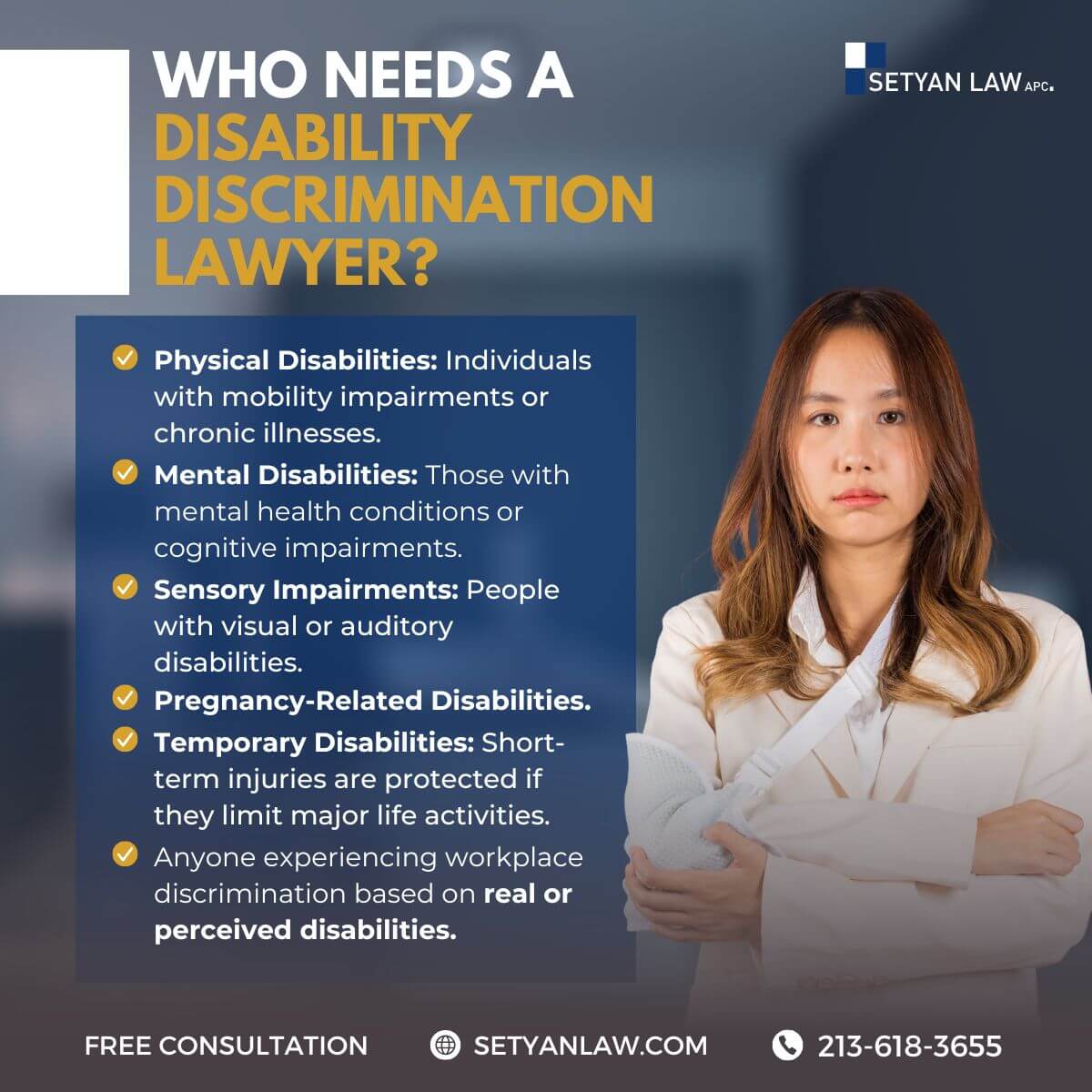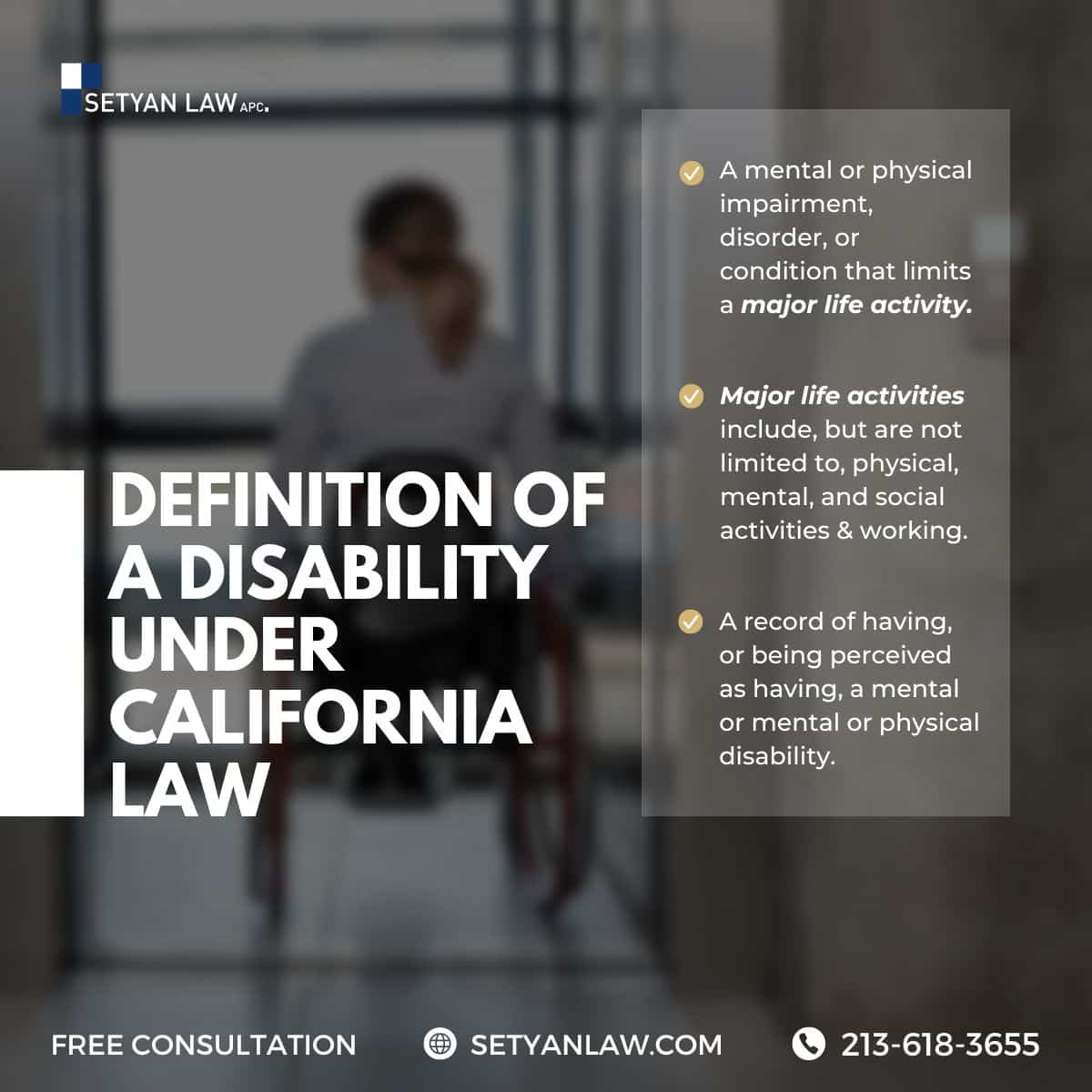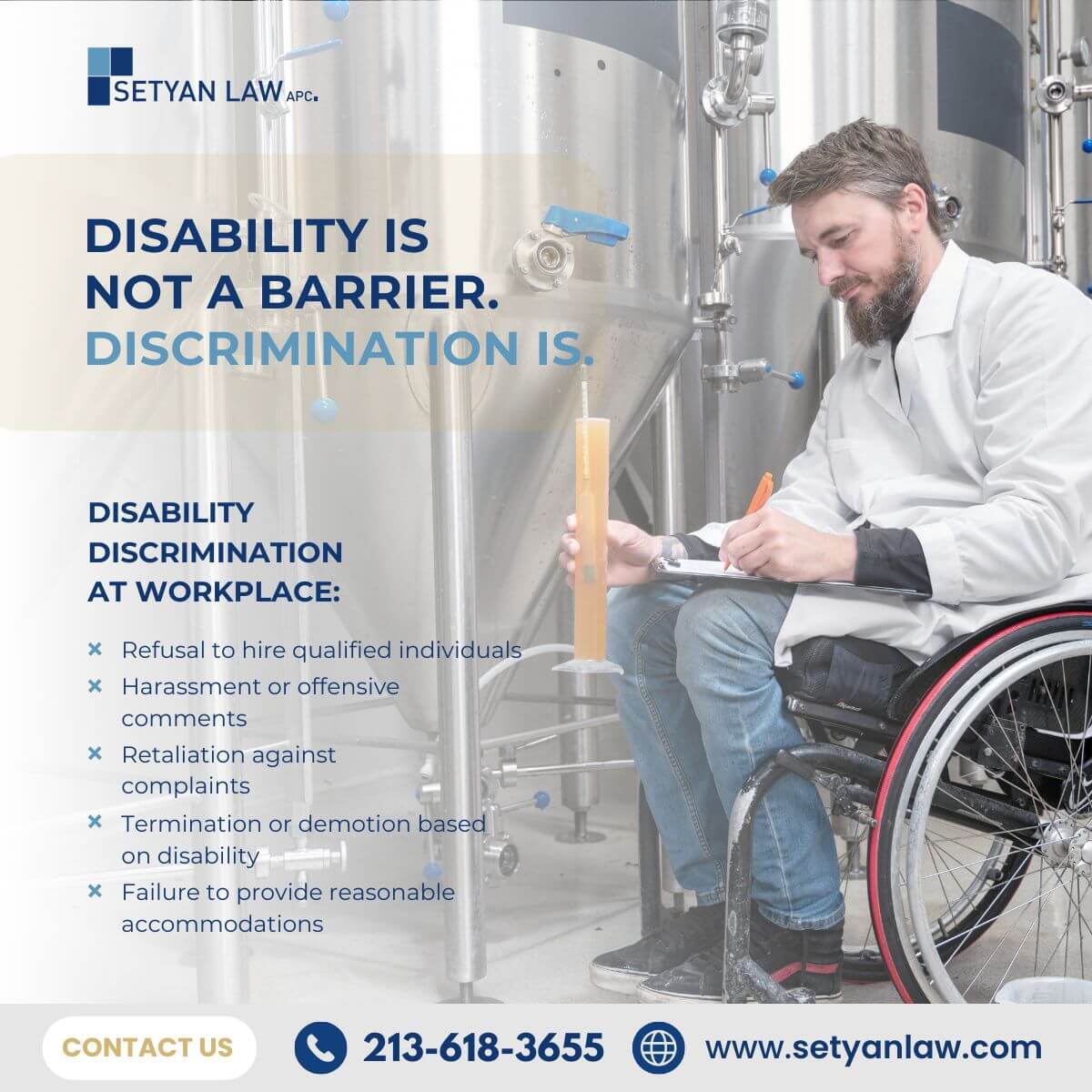Updated November 15, 2025
Protecting Your Rights Against Medical Condition Discrimination
When you face discrimination because of a medical condition or disability, the experience can be overwhelming, stressful, and deeply unfair. Fortunately, both federal and California law provide strong protections for individuals living with disabilities or health conditions. If you believe you’ve been mistreated at work, denied access to services, or harassed because of your medical condition, a California ADA medical discrimination lawyer can help you assert your rights and pursue justice.
This guide explains your legal protections, how the ADA applies, what qualifies as a protected class, and how an experienced Medical Discrimination lawyer can help you build a successful claim.
Understanding Medical Condition Discrimination in California
Medical condition discrimination occurs when an employer, business, or service provider treats someone unfairly because of a physical or mental health condition. Under both then Americans with Disabilities Act (ADA) and California’s Civil Rights Department (CRD), it is illegal to discriminate based on:
- Physical disabilities
- Mental disabilities
- Medical conditions (including cancer, genetic conditions, and chronic illnesses)
- Perceived disabilities or medical conditions
These protections apply in employment, housing, public accommodations, transportation, and other essential services.
If you have been fired, denied accommodations, refused service, or harassed because of your health status, you may have grounds for a legal claim.
It’s always best to consult a qualified Medical Condition Discrimination Attorney regarding your case before you file. Employment law has many pitfalls and an attorney can help you navigate past them safely. Sam Setyan will review your grievance, tell you your options, and guide you to the most favorable outcome possible. It’s your call.
Call 213-618-3655 for a free consultation.
What Counts as a Protected Class?
A protected class is a group of people legally shielded from discrimination under federal or state law. In California, disability and medical conditions are among the most strongly protected classifications.
You are part of a protected class if you:
- Have a physical or mental disability
- Have a serious medical condition or chronic illness
- Are recovering from such a condition
- Are perceived to have a disability
- Have a history of disability
- Are associated with someone who has a disability
Even if your condition is invisible (for example, anxiety, autoimmune disorder, diabetes), the law still protects you.
ADA Discrimination: What the Law Says
The Americans with Disabilities Act (ADA) prohibits discrimination in employment and public accommodations. Under the ADA, individuals with disabilities have the right to:
- Reasonable accommodations at work
- Equal access to public spaces and services
- Freedom from harassment or retaliation
- Fair treatment during hiring, firing, and promotions
Violations may include:
- Refusing to hire someone because of a medical condition
- Denying reasonable accommodations such as modified duties or medical leave
- Harassment based on disability
- Denying access to buildings, services, or programs
If you were denied your ADA rights, a California ADA medical discrimination lawyer can help file a claim or lawsuit.
Call Setyan Law at (213)-618-3655 to schedule a free consultation.
Why You Need an ADA Compliance Lawyer
Businesses, employers, and public entities must follow strict ADA accessibility and nondiscrimination rules. When they fail to meet these requirements, individuals can suffer significant harm.
A skilled ADA compliance lawyer will:
- Evaluate your case and determine if your rights were violated
- Gather medical records, witness statements, and evidence
- File claims with the EEOC or California Civil Rights Department
- Pursue compensation for lost wages, emotional distress, and damages
- Fight for policy changes, accommodations, or reinstatement if applicable
Because medical discrimination cases can be legally complex, it is crucial to work with an attorney experienced in ADA law and California disability protections.
Common Examples of Medical Condition Discrimination
You may have a valid claim if any of the following occurred:
Employment
- Fired after disclosing a medical condition
- Denied time off for surgery, treatment, or appointments
- Refused reasonable accommodations
- Demoted or reassigned unfairly
- Bullied or harassed because of health issues
Public Accommodations
- Denied access to a business or facility
- Refused service due to disability
- Business lacks required ADA accessibility
- Public entity fails to provide reasonable modifications
Housing
- Rejected rental application due to disability
- Denied reasonable accommodations for service animals or accessibility needs
If any of these situations sound familiar, a Medical Discrimination lawyer can help you understand your options.
How a California ADA Medical Discrimination Lawyer Helps Your Case
An attorney experienced in ADA and medical condition cases provides essential legal support, including:
- Case evaluation to determine the strength of your claim
- Evidence collection to prove discrimination occurred
- Filing complaints with the correct state or federal agencies
- Negotiation and settlement to maximize compensation
- Litigation if your case goes to court
Compensation may include lost wages, emotional distress, punitive damages, and more.
Understanding Your Rights: California Medical Leave and Disability Protections
When facing health challenges that impact your ability to work, understanding your rights under California medical leave laws becomes crucial. The Golden State offers some of the most comprehensive protections for employees dealing with medical conditions, disabilities, or family health emergencies. These safeguards extend beyond federal requirements, providing California workers with robust legal support during difficult times.
Navigating the complex landscape of medical leave entitlements can be overwhelming, especially when you’re already managing health concerns. Many employees find themselves uncertain about their options when illness strikes or when they need to care for a family member. This uncertainty often leads to unnecessary stress during already challenging circumstances.
California’s legal framework for medical leave combines federal protections like the Americans with Disabilities Act (ADA) and Family Medical Leave Act (FMLA) with state-specific provisions that expand these rights. Understanding how these laws work together can make a significant difference in preserving your job security and financial stability during health-related absences.
Whether you’re dealing with a temporary medical condition, a long-term disability, or caring for a loved one, knowing your legal entitlements empowers you to advocate for yourself effectively. Let’s explore the comprehensive protections available to California workers and how you can access them when needed.
California Medical Leave Laws: An Overview
California’s approach to medical leave stands out nationally for its employee-friendly provisions. The state has established a multi-layered system of protections that work in conjunction with federal regulations to ensure workers have access to necessary time off for health-related needs.
The California Family Rights Act (CFRA) parallels the federal FMLA but offers expanded coverage in several key areas. While both provide up to 12 weeks of protected leave, CFRA extends eligibility to more family relationships and medical situations. This means California employees often have greater flexibility when needing time away from work.
Additionally, the state’s Paid Family Leave (PFL) program provides partial wage replacement during qualifying absences. Unlike many other states, California ensures that taking necessary medical leave doesn’t automatically mean sacrificing your entire income. This financial support proves invaluable for workers facing extended health-related absences.
The Fair Employment and Housing Act (FEHA) further strengthens these protections by prohibiting discrimination based on medical conditions or disabilities. FEHA’s definition of disability is notably broader than federal standards, covering more conditions and providing greater workplace accommodations.
Understanding how these various laws interact creates a comprehensive safety net for California workers. When properly utilized, these protections ensure that medical challenges don’t unnecessarily jeopardize your employment or financial stability.
Understanding ADA Protections in California
The Americans with Disabilities Act serves as a foundational protection for workers with disabilities nationwide, but California enhances these safeguards through additional state provisions. The ADA prohibits discrimination against qualified individuals with disabilities in all employment practices, including hiring, firing, advancement, compensation, and job training.
In California, the definition of disability extends beyond federal standards to include conditions that limit a major life activity rather than substantially limit it. This crucial distinction means more medical conditions qualify for protection under state law than under federal regulations alone. Conditions that might not meet the federal threshold often qualify under California’s more inclusive standard.
Employers in California must engage in what’s called an "interactive process" when an employee requests accommodation for a disability. This collaborative approach requires meaningful dialogue to identify effective workplace adjustments. The process should explore various options rather than dismissing accommodation requests outright.
Reasonable accommodations might include modified work schedules, reassignment to vacant positions, acquisition of specialized equipment, or physical workplace modifications. The key consideration is whether the accommodation enables the employee to perform essential job functions without imposing undue hardship on the employer’s operations.
California law also protects employees from retaliation when they assert their rights under disability laws. This means your employer cannot legally punish you for requesting accommodations, taking protected leave, or filing a complaint about disability discrimination.
Medical Condition Discrimination: Know Your Rights
Medical condition discrimination occurs when an employer treats an employee unfavorably because of their health status. This discriminatory treatment violates both federal and California state laws, which provide robust protections for workers facing health challenges.
Under California law, employers cannot make adverse employment decisions based on an employee’s medical condition. This prohibition covers actions like termination, demotion, denial of promotion, or harassment. The protection extends to both current medical conditions and history of past conditions, ensuring comprehensive coverage for affected workers.
Importantly, California law specifically identifies cancer and genetic characteristics as protected categories. This means employers cannot discriminate against employees who have cancer, are cancer survivors, or have genetic predispositions to certain medical conditions. This specific protection demonstrates California’s progressive approach to medical condition discrimination.
When facing potential discrimination, documentation becomes crucial. Keep detailed records of any discriminatory comments, actions, or patterns you observe. Note dates, times, locations, and witnesses whenever possible. This evidence strengthens your position should you need to file a formal complaint or lawsuit.
If you believe you’ve experienced medical condition discrimination, you have options for seeking justice. You can file a complaint with California’s Department of Fair Employment and Housing (DFEH) or the federal Equal Employment Opportunity Commission (EEOC). These agencies investigate claims and may help resolve the situation through mediation or other interventions.
Reasonable Accommodations: What to Expect
Reasonable accommodations represent adjustments or modifications that enable employees with disabilities or medical conditions to perform their essential job functions. California law requires employers to provide these accommodations unless doing so would create undue hardship for the business.
The accommodation process begins when an employee discloses their disability or medical condition and requests workplace adjustments. While formal documentation isn’t always required initially, employers may request medical verification to better understand the employee’s limitations and accommodation needs. This verification should focus on functional limitations rather than detailed medical diagnoses.
Effective accommodations vary widely depending on the individual’s needs and job requirements. Common examples include flexible scheduling, telecommuting options, ergonomic equipment, reassignment of marginal job duties, or physical modifications to the workspace. The key is finding solutions that address the specific barriers the employee faces.
The interactive process requires good-faith participation from both employer and employee. This means open communication, willingness to consider various options, and reasonable compromise when necessary. The goal isn’t necessarily to provide the exact accommodation requested, but rather to find an effective solution that works for both parties.
Remember that accommodations should be evaluated on a case-by-case basis. What works for one employee may not be appropriate for another, even with similar conditions. The focus remains on addressing individual needs while maintaining essential job functions.
Family and Medical Leave Act in California Context
The Family and Medical Leave Act provides eligible employees with up to 12 weeks of unpaid, job-protected leave annually. In California, these federal protections work alongside state provisions to create more comprehensive coverage for workers facing medical challenges.
FMLA leave can be used for several qualifying reasons, including serious health conditions that make the employee unable to perform job functions, caring for an immediate family member with a serious health condition, childbirth and newborn care, or adoption or foster placement of a child. The law ensures your job (or an equivalent position) remains available upon your return.
California’s CFRA expands these protections by covering additional family relationships not included under federal law. While FMLA limits family care leave to spouses, children, and parents, CFRA extends coverage to domestic partners, grandparents, grandchildren, and siblings. This broader definition acknowledges the diverse family structures that exist in modern society.
To qualify for FMLA/CFRA leave, employees must have worked for their employer for at least 12 months and accumulated at least 1,250 hours of service during that period. Additionally, the employer must have at least 50 employees within a 75-mile radius of the employee’s worksite. These requirements ensure the laws apply to established employment relationships.
During protected leave, employers must maintain the employee’s health benefits as if they continued working. This crucial provision prevents workers from losing insurance coverage precisely when they might need it most. Upon return, employees must be reinstated to their original position or an equivalent role with comparable pay, benefits, and working conditions.
Call Setyan Law at (213)-618-3655 to schedule a free consultation.
California’s Unique Paid Family Leave Program
Unlike the federal FMLA, which provides only unpaid leave, California offers partial wage replacement through its pioneering Paid Family Leave program. This state-funded benefit provides approximately 60-70% of your weekly wages for up to eight weeks when you need time off to care for a seriously ill family member or bond with a new child.
PFL operates through California’s State Disability Insurance (SDI) program, which employees fund through payroll deductions. This means you’ve been contributing to this benefit throughout your employment in California. When you need to access these funds, you’re simply utilizing a program you’ve helped finance.
The application process for PFL requires medical certification of the serious health condition necessitating your leave. You’ll need to submit documentation from a healthcare provider detailing the nature and expected duration of the condition. This verification ensures benefits go to those with legitimate qualifying needs.
Importantly, PFL provides financial support but doesn’t guarantee job protection on its own. To secure your position during leave, you’ll need to qualify for protection under FMLA, CFRA, or other applicable laws. Understanding how these programs work together helps maximize your benefits and protections during difficult times.
California continues to expand its paid leave programs, recognizing that financial support during medical crises is essential for worker wellbeing. Recent legislative changes have increased benefit amounts and expanded qualifying reasons for leave, demonstrating the state’s commitment to supporting workers through health challenges.
Pregnancy Disability Leave in California
California provides specific protections for employees affected by pregnancy, childbirth, and related medical conditions. These provisions ensure expectant and new mothers can maintain their careers while addressing their health needs during this significant life transition.
Under California law, employees disabled by pregnancy are entitled to up to four months of job-protected leave, regardless of length of service or hours worked for the employer. This protection applies to all employers with five or more employees, making it more accessible than FMLA or CFRA leave, which have stricter eligibility requirements.
Pregnancy disability leave (PDL) covers conditions like severe morning sickness, prenatal care, childbirth recovery, postpartum depression, and other medical issues related to pregnancy. The determining factor is whether the condition prevents the employee from performing essential job functions. A healthcare provider’s certification typically establishes this disability status.
Importantly, PDL is separate from and in addition to bonding leave available under CFRA. This means eligible employees can take up to four months of PDL for pregnancy-related disability, followed by 12 weeks of CFRA leave for bonding with their newborn. This sequential use provides substantial protected time for new parents.
During PDL, employers must maintain health coverage under the same conditions as if the employee continued working. Upon return, employees must be reinstated to the same position or a comparable role. These guarantees ensure pregnancy doesn’t derail women’s career trajectories or economic security.
Filing a Complaint: Timelines and Procedures
When facing medical condition discrimination or leave violations, understanding the complaint process becomes essential. California provides specific procedures for addressing these workplace issues through administrative agencies before pursuing litigation.
The first step typically involves filing a complaint with California’s Department of Fair Employment and Housing (DFEH). This administrative complaint must generally be filed within three years of the alleged violation. The DFEH will investigate your claim, potentially facilitating mediation between you and your employer to resolve the issue without litigation.
Alternatively, you may file a complaint with the federal Equal Employment Opportunity Commission (EEOC), which handles ADA violations and other forms of discrimination. EEOC complaints must typically be filed within 300 days of the discriminatory act in California. This shorter timeline makes understanding your options and acting promptly crucial.
After filing with either agency, you’ll receive a "right to sue" notice once the investigation concludes or after a certain period. This document allows you to proceed with a lawsuit in court if the administrative process doesn’t resolve your situation satisfactorily. The notice typically provides a limited window (often one year) to file your lawsuit.
Working with an experienced employment attorney throughout this process can significantly improve your chances of success. Legal counsel can help gather evidence, prepare compelling documentation, navigate procedural requirements, and represent your interests effectively during negotiations or litigation.
Seeking Legal Assistance for Medical Leave Issues
Navigating California’s complex medical leave laws often requires professional guidance. An experienced employment attorney can provide invaluable assistance when facing discrimination, leave denials, or accommodation issues related to your health condition.
Legal representation becomes particularly important when your employer disputes your entitlement to leave or accommodations. Attorneys specializing in employment law understand the nuances of California’s protections and can effectively advocate for your rights. They can evaluate whether your situation qualifies under relevant laws and identify the strongest legal arguments for your case.
Many employment attorneys offer contingency fee arrangements for discrimination cases, meaning you pay legal fees only if your case succeeds. This approach makes legal representation accessible even when financial resources are limited due to medical challenges or employment disruptions. Initial consultations are often provided at no cost to evaluate your situation.
When selecting an attorney, look for experience specifically with medical leave and disability discrimination cases. Ask about their familiarity with California’s unique provisions beyond federal protections. The right attorney will understand both the legal framework and the practical realities of navigating health challenges in the workplace.
Remember that legal assistance isn’t just for filing lawsuits. An attorney can help negotiate accommodations, draft effective leave requests, respond to employer inquiries, and resolve disputes before they escalate to litigation. Early legal guidance often prevents problems from developing into more serious conflicts.
Compensation and Remedies in Discrimination Cases
When medical condition discrimination or leave violations occur, California law provides various remedies to make affected employees whole. Understanding potential compensation helps you evaluate your options when facing workplace discrimination.
Successful discrimination claims may result in back pay for lost wages and benefits if you were terminated, demoted, or denied promotion based on your medical condition. This compensation aims to restore the income you would have earned absent the discriminatory treatment. In some cases, front pay may be awarded if reinstatement isn’t feasible.
California law also allows recovery for emotional distress damages resulting from discrimination. These damages acknowledge the psychological impact of discriminatory treatment, which often causes anxiety, depression, humiliation, and other emotional harm. Documentation from mental health providers can strengthen claims for these damages.
In cases involving particularly egregious conduct, punitive damages may be available. These damages punish employers for especially malicious or reckless discrimination and deter similar behavior in the future. California law permits substantial punitive damages in appropriate cases, though they require proving heightened misconduct.
Successful plaintiffs can also recover attorney’s fees and litigation costs. This provision ensures access to justice regardless of financial resources and incentivizes attorneys to represent employees with valid claims. The potential for fee recovery often motivates employers to settle legitimate claims rather than risk greater liability after trial.
Preventive Measures: Protecting Your Rights Proactively
Taking proactive steps can help protect your rights and prevent discrimination before it occurs. Understanding how to document your condition, request accommodations properly, and maintain appropriate communication with your employer creates a foundation for successful workplace integration.
When disclosing a medical condition or disability, do so in writing whenever possible. This creates a clear record of your disclosure and any subsequent requests. Be specific about your limitations and needed accommodations rather than simply stating your diagnosis. Focus on how accommodations will enable you to perform your job effectively.
Maintain copies of all medical documentation, accommodation requests, and employer responses. Create a timeline of significant events, including conversations about your condition or accommodations. This documentation proves invaluable if disputes arise later regarding what was requested or how your employer responded.
Familiarize yourself with your company’s policies regarding medical leave, accommodations, and complaint procedures. Following established protocols demonstrates your good faith and compliance with company requirements. It also prevents employers from claiming procedural deficiencies in your requests.
Consider consulting an employment attorney before significant interactions regarding your medical condition, particularly if you anticipate resistance from your employer. Early legal guidance can help frame your requests appropriately and establish a strong foundation for protecting your rights throughout the accommodation or leave process.
Recent Developments in California Medical Leave Law
California continues to enhance its medical leave protections through legislative updates and court decisions. Staying informed about these developments helps you understand the full extent of your rights in the evolving legal landscape.
Recent legislation has expanded paid family leave benefits, increasing both the benefit amount and the maximum duration of paid leave. These changes acknowledge the financial challenges workers face when health issues necessitate time away from work. The trend toward more comprehensive paid leave continues as California recognizes its importance for worker wellbeing.
Court decisions have clarified employers’ obligations regarding the interactive process for accommodations. Recent rulings emphasize that employers must engage meaningfully rather than simply going through procedural motions. These decisions strengthen employees’ positions when requesting reasonable workplace adjustments for medical conditions.
The COVID-19 pandemic prompted temporary expansions of medical leave protections, some of which have influenced permanent policy changes. The pandemic highlighted gaps in existing leave frameworks and accelerated discussions about more comprehensive protections for workers facing health challenges.
California’s Department of Fair Employment and Housing continues to issue updated guidance on medical condition discrimination and accommodation requirements. These administrative interpretations provide valuable insights into how the department approaches enforcement and what standards employers must meet to comply with state law.
As California’s workforce and healthcare landscape evolve, medical leave protections continue to adapt accordingly. Staying connected with legal resources and advocacy organizations helps ensure you remain aware of your rights as they expand and develop through legislative and judicial action.
Take Action: Protect Your Rights Today
If you believe you’ve been treated unfairly because of your disability or health condition, you do not have to face it alone. California provides some of the strongest protections in the nation, and an experienced California ADA medical discrimination lawyer can help you enforce them.
Standing up to discrimination not only helps you reclaim your rights, but also protects others from facing the same injustice.
Call Setyan Law at (213)-618-3655 to schedule a free consultation.









